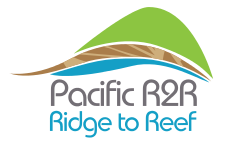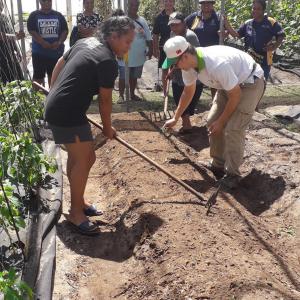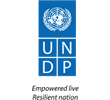Project Overview
The Nauru Ridge to Reef (R2R) GEF Project has been designed to develop, establish and implement a government and community partnership approach to increase knowledge for better management of natural resources and ecosystem services for the entire Island of Nauru (South Pacific) through innovative integrated land, water, biodiversity, coastal and marine management approaches thereby protecting and increasing livelihoods opportunities, food security, and enhancing climate resilience. These goals will be achieved by building Nauru’s capacity to implement a comprehensive cross sectorial regime for sustainable land, freshwater water, solid waste, coastal and marine area management and ensuring the initiatives are mainstreamed and established into all levels of decision making including government policy, laws and regulations and community plans.
The project is part of the broader Pacific Regional Program on “Pacific Islands Ridge-to-Reef National Priorities – Integrated Water, Land, and Coastal Management to Preserve Biodiversity, Ecosystem Services, Store Carbon, Improve Climate Resilience and Sustain Livelihoods”. This program is designed to build stronger linkages between sustainable development and management of freshwater ecosystems (e.g. ground water systems for Nauru) and coastal/marine areas and promotes the implementation of holistic, integrated management of natural resources.
The goals of this Nauru R2R Project will be achieved through four specific project level outcomes interventions that are directly interconnected at national and site based community (district) levels. These include (i) Improved management effectiveness of new marine conservation areas, (ii) Integrated landscape management practices adopted by local communities living within the ‘bottom-side’ and applicable ‘ridge’, and ‘topside’ areas not covered by mining, (iii) Biodiversity conservation and Sustainable Land Management (SLM) mainstreamed in policy and regulatory frameworks, and (iv) Knowledge Management.
To achieve integrated management of terrestrial and marine systems in Nauru the project will build upon the participatory process facilitated in the development of the R2R Program Framework Document (PFD) which included extensive stakeholder dialogues in the development, and will implement innovative and creative project activities to address critical knowledge gaps in environmental and ecosystem services. This project proposes a long-term solution by implementing a ridge-to-reef approach that combines functional, representative and sustainable national system of coastal and marine managed areas that are integrated with the adoption of appropriate SLM practices in adjoining / upstream watersheds. By also improving government capacity, the proposed project will effectively reduce land degradation and enhance protection for marine and coastal biodiversity and habitats, whilst improving coastal livelihoods and creating lasting management of Nauru’s natural resources.
Results Framework
UNDAF Outcome(s): UNDAF for the Pacific Sub-region 2013-2017 – Outcome Area 1: Environmental management, climate change and disaster risk management.
UNDP Strategic Plan Environment and Sustainable Development Primary Outcome: Legal and regulatory frameworks, policies and institutions enabled to ensure the conservation, sustainable use, and access and benefit sharing of natural resources, biodiversity and ecosystems, in line with international conventions and national legislation (Output 2.5).
Expected UNDAF Outcome(s): Nauru’s draft 2013-2017 UNDAF: National and local capacities ably respond to climate change and natural disasters, and sustainably manage and coordinate water resources. UNDP Sub-Regional Programme Document for Pacific Island Countries 2013-2017: Environmental management, climate change and disaster risk management.
Implementing Partner: Environment Division, Department of Commerce, Industry & Environment (DCIE).
Responsible Parties: Nauru Fisheries & Marine Resources Authority (NFMRA); and Environment Division, Department of Commerce, Industry & Environment (DCIE).






